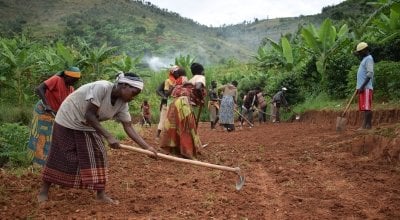
Knowledge Hub
Evidence-based learning, evaluations, research, guidance, manuals, tools and programme updates.
How is the conflict in Burundi affecting ordinary people?

The Mabayi mountains in Burundi. Credit: Concern Worldwide
A year of unrest in the African country has forced hundreds of thousands of Burundians to flee their homes. Millions of people aren’t getting the food they need.
The conflict has been devastating
- A quarter of a million Burundians have fled the country in the last 12 months. Most have gone to nearby Tanzania (136,000) and Rwanda (76,600). The UN is expecting the number of refugees to reach at least 330,000 by the end of the year.
- About 3.6 million people, more than the population of Wales, are not getting the food they need. 150,000 children under five are thought have acute malnutrition.
- Fighting has made it harder for people to travel and sell their food at market.
- Burundi has also been badly hit by flooding linked to the El Nino weather system. This has killed 64 people and forced tens of thousands from their homes, destroyed 10,083 hectares of crops, and made 50 bridges impassable.
- The flooding is also thought to be one reason cases of malaria have risen to over 1 million.
Our response
Concern has been working in Burundi since 1994, and our projects are still running despite the unrest. These help communities find better ways to earn a living, eat a nutritious diet and stay healthy. The results will help people escape poverty and build a brighter future.
We are also treating and preventing malnutrition in refugee camps in Rwanda, where many people who have fled the violence are staying. And in Burundi itself we are watching the situation closely, ready to do what we can to support those who are most affected.






